Whitaker Award for MS Research

This award is presented to young and emerging scientists whose works are deemed to have substantial promise to increase the understanding of the pathophysiology, immunology, genetics and/or epidemiology of MS. It is named in honor of John Whitaker, MD, a pioneer and role model in MS research, particularly interested in the immunological and chemical aspects of neurological and neuromuscular disorders.
Since the inception of the CMSC’s Whitaker Track, now chaired by Dr. Ahmed Obeidat, the Foundation of the Consortium of Multiple Sclerosis (FCMSC) has been pleased to present the Whitaker Prize for MS Research, supported by grants from EMD Serono.
Whitaker Research Award Winners
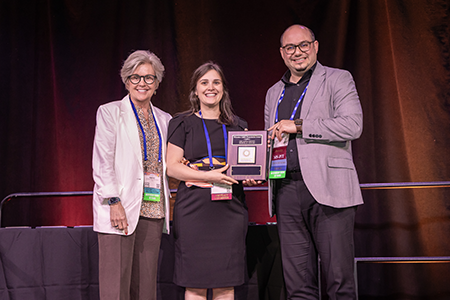
Real World Efficacy of Cladribine Tablets in a Canadian Tertiary Centre Beyond 4 Years after Initiation
Katherine M Sawicka, MD
Unity Health Toronto, St. Michael’s Hospital
University of Toronto
SickKids Research Institute, The Hospital for Sick Children
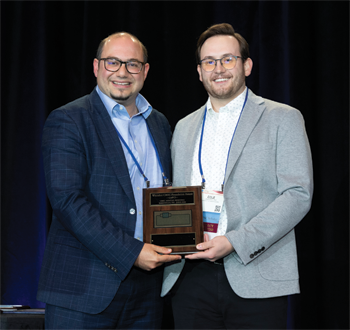
Preclinical Testing of Novel Small Molecules Inhibits Neurodegeneration: Implications for the Pathogenesis and Treatment of Multiple Sclerosis
Cole D. Libner
College of Medicine, University of Saskatchewan, Saskatoon, Canada; Office of the Saskatchewan MS Clinical Research Chair, University of Saskatchewan, Saskatoon, Canada
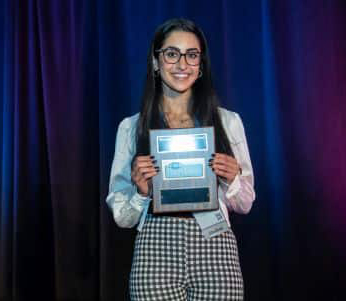
Taylor N. Takla, Wayne State University
Patricia N. Matsuda, University of Washington
Tracy E Herring, University of Washington Medical Center
Nora E. Fritz, Wayne State University
Ana M. Daugherty, Wayne State University
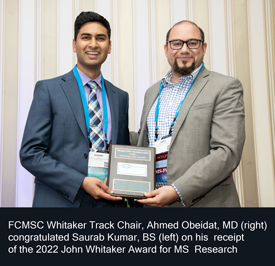
Targeted CSF Proteomics as a Tool For Analyzing Immunophenotype Heterogeneity In Multiple Sclerosis
Saurabh Kumar, BS, Department of Dermatology, University of Massachusetts Chan Medical School, Worcester, MA | Department of Neurology, University of Massachusetts Memorial Medical Center, Worcester, MA
Khashayar Afshari, MD, MPH, Department of Dermatology, University of Massachusetts Chan Medical School, Worcester, MA
Alexandra Rabin, BA, University of Massachusetts Memorial Medical Center, Worcester, MA
Farnaz Khalighinejad, MD, University of Massachusetts Memorial Medical Center, Worcester, MA
Nimmy Francis, PhD, MBBS, University of Massachusetts Memorial Medical Center, Worcester, MA
Fatima Qutab, University of Massachusetts Chan Medical School, Worcester, MA
Danny Kwong, University of Massachusetts Chan Medical School, Worcester, MA
Irina Radu, MD, Division of Cardiovascular Medicine, University of Massachusetts Chan Medical School, Worcester, MA Idanis Berrios-Morales, MD, Department of Neurology, University of Massachusetts Memorial Medical Center, Worcester, MA
Christopher Hemond, MD, Department of Neurology, University of Massachusetts Memorial Medical Center, Worcester, MA Dalia Abou Zeki, MD, Atrium Health Neurosciences Institute Neurology Kenilworth, Charlotte, NC
Jillian M Richmond, PhD, Department of Dermatology, University of Massachusetts Chan Medical School, Worcester, MA
and Carolina Ionete, MD, PhD, Department of Neurology, University of Massachusetts Memorial Medical Center, Worcester
Utility of the Nih Toolbox Cognition Battery in Multiple Sclerosis
Anita Shankar, M.S., Heena R. Manglani, M.A., Oyetunde Gbadeyan, Ph.D. and Ruchika S. Prakash, Ph.D., Department of Psychology, The Ohio State University, Columbus, OH
Dysfunctional RNA Binding Protein Biology As Contributors to the Pathogenesis of Autoimmune Disease of the Central Nervous System
Hannah Salapa, University of Saskatchewan
Cole Libner, University of Saskatchewan
Kara Tastad, University of Saskatchewan
Michael C. Levin, University of Saskatchewan

Metabolomics Analysis Identifies Abnormal Bile Acid Metabolism in Multiple Sclerosis
Leah Mische, BS, Johns Hopkins University
Nora E. Fritz, PhD, PT, DPT, NCS, Wayne State University, Detroit, MI
Ioan Belovarski, BS , Mind Research Network, Albuquerque, NM
Jeffrey D Lewine, PhD , Mind Research Network, Albuquerque, NM
Corey C Ford, MD, PhD , Department of Neurology, UNM Health Sciences Center, Albuquerque, NM
Nora E Fritz, PhD, PT, DPT, NCS, Kennedy Krieger Institute; Chuyang Ye, BS, Johns Hopkins University; Jerry Prince, PhD, Johns Hopkins University; Zhen Yang, BS, Johns Hopkins University; Jennifer Keller, PT, Kennedy Krieger Institute; Allen Jiang, BS, Kennedy Krieger Institute; Chen Chun Chiang, B.S., Kennedy Krieger Institute; Rhul Marasigan, B.A., Kennedy Krieger Institute; Peter A Calabresi, MD, FAAN, Johns Hopkins University; Kathleen M Zackowski, PhD, OT, Johns Hopkins University
Albert Joseph, MRes, University of Oxford; Jithin George, MRCP, University of Oxford; Richard Yates, BSc, University of Oxford; Marie Hamard, MSc, University of Oxford; Margaret Esiri, FRCPath, University of Oxford; Gabriele C DeLuca, MD, DPhil, University of Oxford
Interhemispheric Relationships In Multiple Sclerosis: Evaluation By MEG, EEG, and MRI
Ioan Belovarski, BS, UNM Health Sciences Center
Other Authors: Erik V Burton, MD, UNM Health Sciences Center; Jeffrey D Lewine, PhD, UNM Health Sciences Center; Corey C Ford, MD, PhD, UNM Health Sciences Center
Best Platform Presentation by a Young Investigator
Fingolimod inhibits cytotoxic T cells: A novel immunomodulatory effect of the unphosphorylated compound
Achilles Ntranos, MD, Johns Hopkins School of Medicine
Other Authors: Inna V Grishkan, BS, Johns Hopkins School of Medicine; Dionne P Robinson, BS, Johns Hopkins Bloomberg School of Public Health; Olivia J Hall, MSc, Johns Hopkins Bloomberg School of Public Health; Sabra L Klein, PhD, Johns Hopkins Bloomberg School of Public Health; Peter A Calabresi, MD, FAAN, Johns Hopkins School of Medicine; Anne R Gocke, PhD, Johns Hopkins School of Medicine
Best Overall Research by a Young Investigator
Stat1 Regulates Neural Stem-Cell Function By Transcriptional Regulation of Sox9
Jaime Imitola, MD, Harvard Medical School
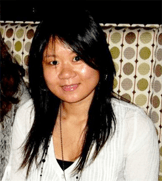 Haiyan Peng, PhD, The Ohio State University, Best Overall Work
Haiyan Peng, PhD, The Ohio State University, Best Overall Work
Dimethyl Fumarate Protects the Central Nervous System Against Excitotoxicity
In the past twenty years, significant progress has been made in both understanding the pathogenesis of Multiple Sclerosis (MS) and treatment of patients with MS. MS seems to be more complicated than just inflammation: in fact, accumulating evidence demonstrates that neurodegeneration is also a large component of MS pathogenesis and contributes to disease progression. This is evidenced by the failure of current therapies to slow down continuous brain atrophy in secondary or primary progressive MS patients (SPMS or PPMS). Therefore, a new challenge for MS research is to develop effective neuroprotective interventions for progressive forms of MS.
One project of my graduate work is to determine the potential neuroprotective effects of dimethyl fumarate (DMF, BG-12 as the brand name), a novel oral medication under the evaluation of Federal Drug Administration. To exclude the strong immunological component (for example in Experimental Autoimmune Encephalitomyelitis), an excitotoxic model of neuro-injury was utilized in our study. Our preliminary data demonstrated that pre-treatment of DMF successfully reduced acute neuronal damage. Moreover, these treated mice had better motor activity compared to untreated mice, suggesting the possible protective effects of DMF. Currently, we are in the process of evaluating the effects of DMF in mice with chronic excitotoxic injury and exploring the molecular mechanisms through which DMF exerts its protective effects in the CNS. We believe that this work will not only help enhance our understanding of MS, but it will also provide a mechanistic foundation for DMF treatment of progressive MS.
 Gloria von Geldern, MD, Johns Hopkins University, Best Poster Presentation
Gloria von Geldern, MD, Johns Hopkins University, Best Poster Presentation
Hand Function in Multiple Sclerosis
Multiple sclerosis (MS) is a demyelinating disease that can affect several areas of the central nervous system and may lead to problems with vision, bladder control, sensation, coordination, or strength. Rating scales can help measure these symptoms and the resulting disability. Most rating scales strongly emphasize impairments in walking when measuring disability in MS. Hand dysfunction is not frequently assessed in MS patients and therefore little is know about the frequency and severity of hand problems. There is also very limited data on how to best measure hand function in MS patients. However, the ability to use your hands impacts quality of life and is critical for maintaining independence in many life tasks. To better evaluate this issue, Drs. von Geldern and Zackowsky at the Johns Hopkins MS Center and Kennedy Krieger Institute are studying hand function in more than a hundred patients with MS, evaluating grip and pinch strength measured with a dynamometer as well as nine-hole-peg test and finger tapping test. The study found that hand dysfunction is a common problem in MS, in particular in individuals with the progressive disease form. More than a third of patients with progressive MS have grip strength less than 50% of healthy controls. The study also shows that grip strength and the nine-hole-peg test measure different aspects of hand dysfunction, suggesting that both tests should be included when evaluating upper extremity disability in MS. The next step is to study hand function longitudinally. This will help determine how well these tests are able to detect changes in hand function and to quantify the extent that hand function changes in individuals with MS. This information will be important when designing trials that study the effect of rehabilitation interventions for individuals with MS. It may also be a helpful tool when developing medications aimed to help individuals with MS regain function by promoting remyelination.
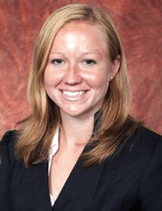 Rachel Tripoli, 3rd year Medical Student, Florida State University College, Best Platform Presentation
Rachel Tripoli, 3rd year Medical Student, Florida State University College, Best Platform Presentation
This study was a pilot study of patients with multiple sclerosis (MS) who have reduced visual acuity and it demonstrated a correlation between a low functional ambulation profile (FAP) score and increased fall risk. This risk shown to be minimized by the wearing of contrast enhancing lenses.
The Labe Scheinberg Award

For outstanding work in the field of neurorehabilitation. This award also honors the multi-disciplinary spirit prevalent among MS professionals. Dr. Labe Scheinberg was one of the earliest advocates for bringing together professionals from many disciplines to address MS. This award is generously supported annually by family members of Dr. Scheinberg. The FCMSC gratefully acknowledges the contributions of Mr. and Mrs. William Kristol, Dr. David Scheinberg, Dr. & Mrs. Ranard and Dr. Grace Minamoto.
The Labe Scheinberg Awardees
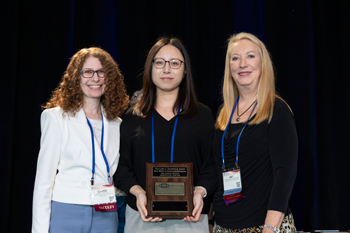 Peixuan Zheng, PhD
Peixuan Zheng, PhDDepartment of Kinesiology and Nutrition, University of Illinois Chicago, Chicago, IL.
Peixuan Zheng,1, Brian M. Sandroff,2,3, Robert W. Motl11
1Department of Kinesiology and Nutrition, University of Illinois Chicago, Chicago, IL; 2
Center for Neuropsychology and Neuroscience Research, Kessler Foundation, West Orange, NJ; 3Department of Physical Medicine and Rehabilitation, Rutgers New Jersey Medical School, Newark, NJ
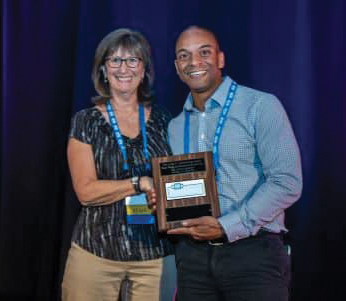 Laura A Swink, PhD, OTR/L, et al
Laura A Swink, PhD, OTR/L, et alLaura A Swink, PhD, OTR/L, 1,2,3, Wesley Thornton, DPT2, Kathryn A Nearing, PhD, MA1,2, Mark M Manago, PT, PhD1,2,4 and University of Colorado
(1)Eastern Colorado Geriatric Research Education and Clinical Center (GRECC), Veterans Administration, Aurora, CO, (2)Department of Physical Medicine and Rehabilitation, University of Colorado Anschutz Medical Campus, Aurora, CO, (3)Research, Veterans Administration, Aurora, CO, (4)Department of Neurology, University of Colorado School of Medicine, Aurora, CO
Physical Therapy, University of Alabama at Birmingham, Birmingham, AL
Department of Neurosciences and Mental Health, The Hospital for Sick Children, Toronto, ON, Canada
University of Michigan-Flint, Flint, MI
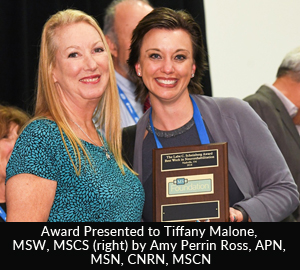 Tiffany Malone, MSW, MSCS
Tiffany Malone, MSW, MSCSBrian Hutchinson, PT, MSCS
Dignity Health, Citrus Heights, CA
Amy Thiessen, PT
Gabriel Pardo, MD
MS Center of Excellence, Oklahoma Medical Research Foundation
Oklahoma City, OK
Telerehabilitation in MS: Gait, Balance, and Patient-Reported Outcomes
 Kathleen Costello, MS, ANP-BC, MSCN
Kathleen Costello, MS, ANP-BC, MSCNVice president of Healthcare Access, National Multiple Sclerosis Society
New York, NY
University of Illinois at Urbana-Champaign
Champaign, IL
Robert Motl, PhD
University of Illinois at Urbana-Champaign
Champaign, IL
Department of Rehabilitation and Movement Sciences
Rutgers, The State University of New Jersey
Stratford, NJ
Neurology, Oregon Health and Science University
Portland, OR
The Fes-I Predicts Falls and ABC Scores In People With Multiple Sclerosis
 The 2012 awardee, Sangeeta T. Mahajan, MD, F.A.C.O.G., of University Hospitals Case at Medical Center, Cleveland, Ohio, presented research titled, “Pelvic Floor Disorders and Multiple Sclerosis: Are Patients Satisfied with their Care?” Dr. Majahan holds a dual appointment in Obstretrics and Gynecology and Urology. She is recognized nationally for her work on Botulinium A Toxin for the treatment of refractory overactive bladder and outcomes research.
The 2012 awardee, Sangeeta T. Mahajan, MD, F.A.C.O.G., of University Hospitals Case at Medical Center, Cleveland, Ohio, presented research titled, “Pelvic Floor Disorders and Multiple Sclerosis: Are Patients Satisfied with their Care?” Dr. Majahan holds a dual appointment in Obstretrics and Gynecology and Urology. She is recognized nationally for her work on Botulinium A Toxin for the treatment of refractory overactive bladder and outcomes research.Her team’s work is important to multiple sclerosis, and has been actively aided by Ruth Ann Marrie, MD, MS, FRCPC(C) and Tuula Tryry, PhD, MAED, both affiliated with the NARCOMS MS Patient Registry.
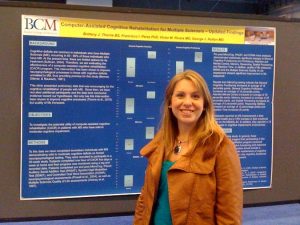 2011 Labe Scheinberg has been awarded to Brittany Thorne, for her project titled “Computer Assisted Cognitive Rehabilitation for Multiple Sclerosis: Updated Findings.“
2011 Labe Scheinberg has been awarded to Brittany Thorne, for her project titled “Computer Assisted Cognitive Rehabilitation for Multiple Sclerosis: Updated Findings.“ Neurology, Jacobs Neurological Institute
University of Buffalo
Buffalo, NY
VALIDITY, RELIABILITY, AND SENSITIVITY OF THREE GAIT MEASURES IN MULTIPLE SCLEROSIS
2009 Labe Scheinberg awardees were Katrina Williams, Specialist Neurological Physiotherapist, Master’s of Applied Science, Bachelor of Physiotherapy, Grad Cert Higher Education from University of Queensland, Australia and Phu Hoang, Doctorate of Physiotherapy, Bachelor of Physiotherapy from Multiple Sclerosis Society of New South Wales, Victoria, Australia. Their work entitled “Two Physiotherapy Models of Service Delivery for People with Multiple Sclerosis” was recognized as the most outstanding work in neurorehabilitation in MS, presented at the CMSC Annual Meeting by the Foundation of the CMSC.
Jose A. Cabrera-Gomez, MD, PhD, FAAN from International Neurological Restoration Center in Havana, Cuba was the recipient of the 2008 Labe Scheinberg award.

